The Right Way Out of Afghanistan
To leave behind a stable government in Afghanistan in 2014, the U.S. needs to work towards electoral reforms, negotiations with the Taliban, and a regional settlement involving Pakistan.
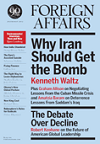 Courtesy: Foreign Affairs
Courtesy: Foreign Affairs
To leave behind a stable government in Afghanistan in 2014, the U.S. needs to work towards electoral reforms, negotiations with the Taliban, and a regional settlement involving Pakistan.
 Courtesy: Embassy of India, Washinton D.C.
Courtesy: Embassy of India, Washinton D.C.
The third India-U.S. Strategic Dialogue saw more talk of ‘mutual capabilities’ than of a mere alliance. The larger endeavour in the bilateral is to find the right fit as partners, where both countries can preserve their strategic autonomy and benefit from their unique positions in the international community.
 Courtesy: Open Democracy
Courtesy: Open Democracy
The NATO withdrawal from Afghanistan in 2014 should be done tactically so that it doesn't destabilize Pakistan. Despite having accepted Pakistani help in the past, the Taliban might empathize with Pakistani Pashtuns and spread the very secessionist tendencies which Pakistan’s Afghan policy was designed to prevent.
 Courtesy: The White House
Courtesy: The White House
Apart from bilateral ties, also at play at the India-U.S. Strategic dialogue is the difficult triangulation in India’s relations with the U.S. and Iran. It does not serve India to get enmeshed in the U.S-Iran confrontation. Instead, the relationship must develop on the basis of realpolitik and mutual interest.
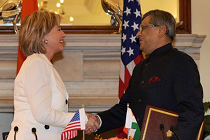 Courtesy: U.S. State Department
Courtesy: U.S. State Department
The setting for the third Indo-U.S. Strategic Dialogue is promising: a global shift of economic weight to Asia, U.S. military exhaustion and indebtedness to China and other factors call for a greater convergence in Indo-U.S. interests than ever before. It is essential then, to take bold decisions at the dialogue.
 Courtesy: IAEA Imagebank/Flickr
Courtesy: IAEA Imagebank/Flickr
Ahead of nuclear talks between Iran and the P5+1 in Moscow, the West seems confident that sanctions will induce Iran to settle on its uranium enrichment. But rather than arriving at a negotiated settlement by applying the principle of reciprocity, the West may look to anaesthetize oil markets.
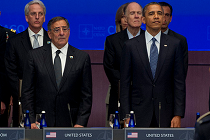 Courtesy: Secretary of Defense/Flickr
Courtesy: Secretary of Defense/Flickr
Pakistan’s refusal to re-open NATO supply routes into Afghanistan has made the country an instant pariah in the U.S. at the NATO Summit. The communiqué released confirms a withdrawal of 130,000 troops by as early as mid-2013. Can the remaining soldiers help maintain peace when a force much larger could not?
 Courtesy: Ministry of External Affairs, India
Courtesy: Ministry of External Affairs, India
U.S. Secretary of State Hillary Clinton's recent visit to China, India, and Bangladesh is keeping with the U.S. pivot to Asia. The choice of countries has strategic significance for the U.S., where India is flagged as balancing the rise of China, and Bangladesh as a strategic base in the Bay of Bengal.
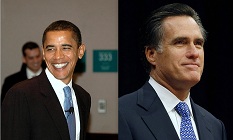 Courtesy: Malwack/Wikimedia Commons
Courtesy: Malwack/Wikimedia Commons
C. Raja Mohan says Indians watching how the U.S. presidential race shapes up shows a growing appreciation of how political developments within the United States can affect Indian interests. He answered questions on a variety of subjects involving India-U.S. relations in this interview with Bernard Gwertzman.
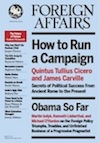 Courtesy: Foreign Affairs
Courtesy: Foreign Affairs
The Western sanctions imposed on Iran to force it to abandon its nuclear programme have succeeded in bringing Tehran back to the negotiating table, but they are a tactic, not a strategy. Any long-term policy has to aim for a democratic Iran.